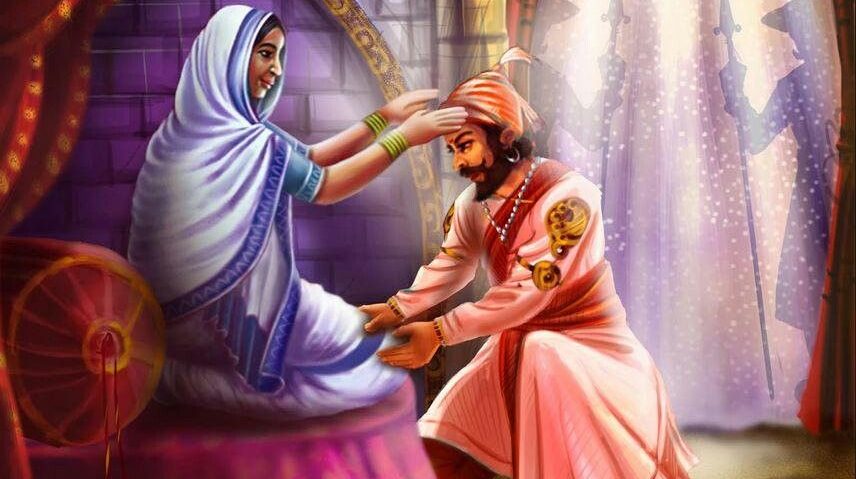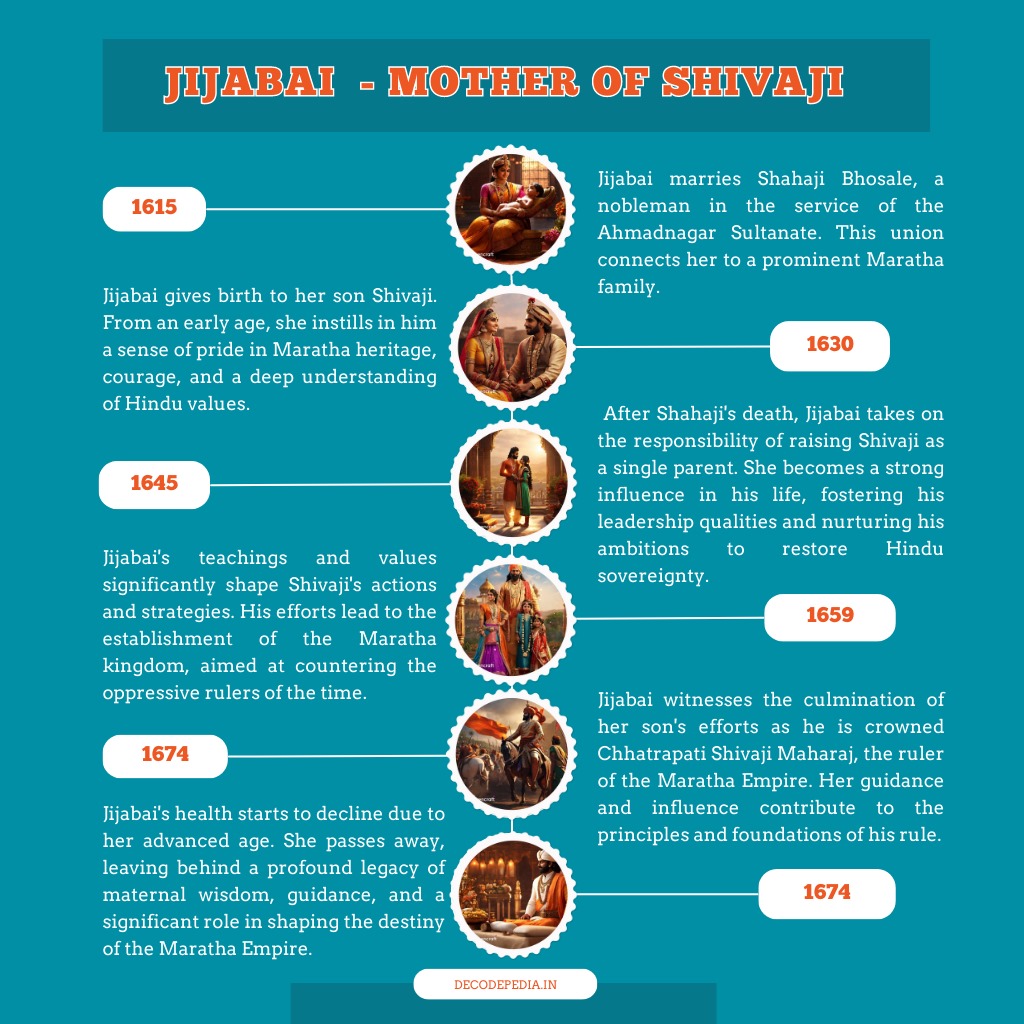Rajmata Jijabai
All of us are aware about the glory of mighty Maratha Empire and Shivaji Maharaj who helped establish such an empire in front of the mammoth Mughals under Aurangzeb. But what we often miss is the role of Chhatrapati Shivaji’s mother Jijabai in the upbringing of Shivaji and shaping of modern India. Through this article, we would try to appreciate the constructive role played by Rajmata Jijabai in shaping the course of historical events in Modern India.
Table of Contents

A brief overview about Jijabai:
Its rightly said that a mother’s duty never ends till her last breathe and Jijabai was one such women who very fittingly portrayed the epitome of motherhood. She played an important role in Shivaji’s upbringing. Shivaji got traits like virtue, valour and courage from her mother (Jijabai). She was the one who asked Shivaji to kill Afzal Khan to avenge the death of her eldest son Sambhaji. She always longed for swaraj and irked upon the thought of nizam and mughals dominating their community.
She believed in dharma and worshiped Mata Bhavani and Mahadev.She also established various temples like Kasba Ganpati Temple (Pune), Tambadi Jogeshwari Temple (Pune), etc. She also had great interest in epics like Ramayana and Mahabharata. She often used to tell stories to Shivaji from these books.
Rajmata Jijabai's Early Life:
She was born in Jadhav family in Maharashtra in the year 1598. Jijabai was married to Shahaji Bhosle of Verul village who then served as the military commnader of Nizam of Hyderabad. However, Jijabai’s father wasn’t very pleased upon the fact that she was married into a Bhosle can, to which Jadhav’s held a age long rivalry. Both Shahji and Jijabai wanted to end the hostilities between Bhosles and Jadhavs. They wanted that both the kingdoms should come together and jointly fight the invaders and help in establishing a Hindu kingdom. But the egoistic Maratha Sardars were hardly convinced by their noble thoughts.
Jijabai had 2 sons – Sambhaji Shahuji Bhosle and Shivaji Bhosle. When Shivaji was 14 years old, because of the political turmoil in Deccan at that time, Shahji handed over the jagir of Pune to Shivaji and Jijabai. Since then Jijabai assumed the position of Rajmata and played a great role in rise of Shivaji.
In 1655, Sambhaji was killed by Afzal khan in fight at Kanakgiri. Later Shivaji fulfilled the promise to his mother to take revenge of his brother’s death by killing Afzal Khan in November 1659.
After the death of Jijabai's husband:
After the death of Shahji Bhosle, she was so heart- broken that she once decided to commit sati. But Shivaji Maharaj prevented her from performing sati. Later she made her all the more strong and she acted as the torchbearer of the Bhosle clan in the then complex and treacherous political landscape. She was actively involved in advising Shivaji on strategic and diplomatic matters.

Her role in rise of Shivaji:
From childhood to becoming the leader of sovereign Maratha Empire, Jijabai had a very influential role in shaping Shivaji’s success. Despite a political turmoil in the Deccan during Shivaji’s childhood, Jijabai ensured that her son received a proper education in diverse subjects like education, administration, military strategy, spacecraft, etc. This foundational education played a great role in later years of Shivaji’s role and often visible in his policy decisions.
Right from his childhood, Rajmata inculcated moral values in him and time and again, kept on emphasizing the importance of justice, fairness, equality and respect for all religions, etc. This reflected in Shivaji’s secular governance structures and justice system.
When Shahji handed over the jagir of Pune to Shivaji in his childhood, it was Jijabai who played a key role in administrative affairs. She also encouraged Shivaji’s ambition of creating a sovereign Maratha Empire and preservation of Maratha Identity
Overall her role in Shivaji’s rise was multi-faceted. She was not only a loving mother but also a mentor, educator, and a source of moral and emotional strength.
Jijabai as Inspiration for other Women
Jijabai’s life and her role in shaping the destiny of her son and the Maratha Empire make her a compelling source of inspiration for women. Her leadership, resilience, commitment to culture and values, and her ability to empower and nurture future leaders serve as a powerful example of what women can achieve when they overcome challenges and strive for excellence.
Jijabai's Death
Jijabai, also known as Rajmata Jijabai, passed away on June 17, 1674. She died in the Raigad Fort, which was the capital of the Maratha Empire established by her son, Chhatrapati Shivaji Maharaj. Her death occurred during a critical period in Maratha history, as the empire was still in its early stages of consolidation and expansion.
Jijabai’s death marked the end of an era, but her influence on Shivaji’s upbringing and the foundation of the Maratha Empire continued to shape its destiny long after her passing. She left behind a lasting legacy of leadership, resilience, and cultural pride, which continued to inspire generations of Marathas and Indians in the years that followed.
FAQs
Jijabai was well known fro being the mother of Shivaji Maharaj. She played a key role in supporting Shivaji in establishing the mighty Maratha Empire.
Jijabai is celebrated as a symbol of strength, resilience, and maternal support in Marathi literature, songs, and folklore. Her legacy continues to inspire Marathas and women in India.
Jijabai passed away on June 17, 1674. Her legacy includes being a key figure in the early years of the Maratha Empire and an inspiration for her son, Shivaji, who went on to become one of India’s greatest warriors and leaders.
